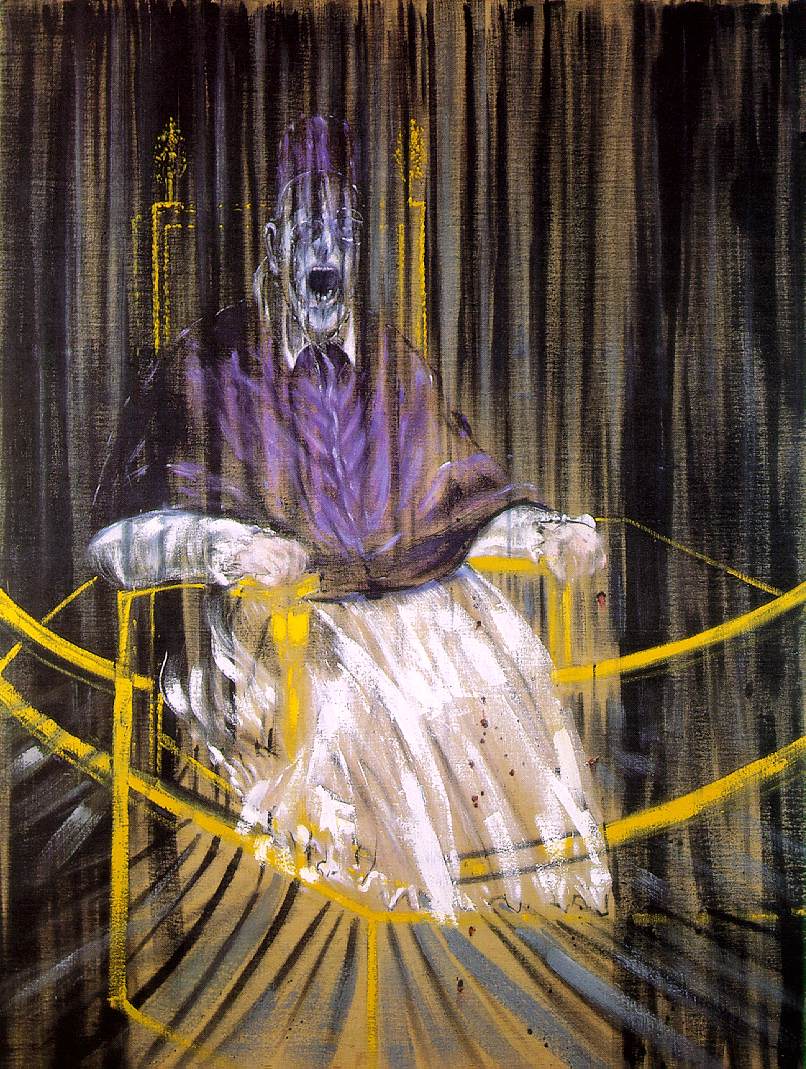Popes: Velásquez and Bacon
Friday, March 1st, 2013 • Politics
For obvious reasons I’ve been thinking about Papal authority (moral, philosophical, financial, political and spiritual) in the past few weeks. Andrew Sullivan is among the loudest voices in the chorus excoriating Pope Benedict for “destroying the moral authority of the Catholic Church” (“The only word for that is evil”). But “Doctor Science” at Obsidian Wings takes a dissenting view, basically pointing out that “the longest-running bureaucracy still in existence” is “of course” overrun with “factions and corruption.” (The specific point of contention has to do with a priest named Marcial Maciel, an accused serial child molester who was embroiled in a power struggle involving Benedict and John Paul II.) That debate, such as it is, could go on, but I was sidetracked by the Doctor’s reference to Velásquez’ 1650 Portrait of Innocent X:

When Francis Bacon used this painting as the basis for his 1953 Study after Velásquez’s Portrait of Pope Innocent X (the famous “screaming Pope”), he insisted that his intentions weren’t political, as he had nothing against Popes; he just needed “an excuse to use these colours, and you can’t give ordinary clothes that purple colour without getting into a sort of false fauve manner.” But judge for yourself:
I saw this painting in London at least a decade ago and I remember reading at the time that the superimposed face was from another source—and a Huffington Post article confirms that Bacon used a still from Eisenstein’s 1925 silent Battleship Potemkin (the one with the baby carriage going down the stairs, which got ripped off in The Untouchables), showing a nun screaming in the moment of being shot “while witnessing a bloodbath killing.”
Bacon (whom Margaret Thatcher called “the man who paints those dreadful pictures”—could you ask for higher praise?) died in 1992, but the savagery of his worldview and the particular lens through which he viewed both ecumenical and secular power has particular relevance today. Who knew, back then, that Sinead O’Connor was ahead of her time? Bacon didn’t throw his career away (as O’Connor did) attacking the Papacy, but the accumulated thousand cuts seem to be finally taking their toll.
ADDENDUM: I just remembered that Jack Nicholson’s Joker made his henchmen deface all the paintings in the Gotham Museum of Art, but stopped them from touching a Francis Bacon, saying, “I kind of like this one.” (It was Figure With Meat, 1954, and thank you Wikipedia.) This uncharacteristically urbane touch from Tim Burton in turn reminds me of Brad Pitt’s alleged insistence that he be allowed to smash a “New Beetle” in Fight Club (wherein his character also both directs his minions to “Destroy a piece of corporate art” and—again at Pitt’s insistence—hurls an epithet at Martha Stewart). Intermingling threads of politics and art…a phenomenon that’s certainly older than the Papacy.
